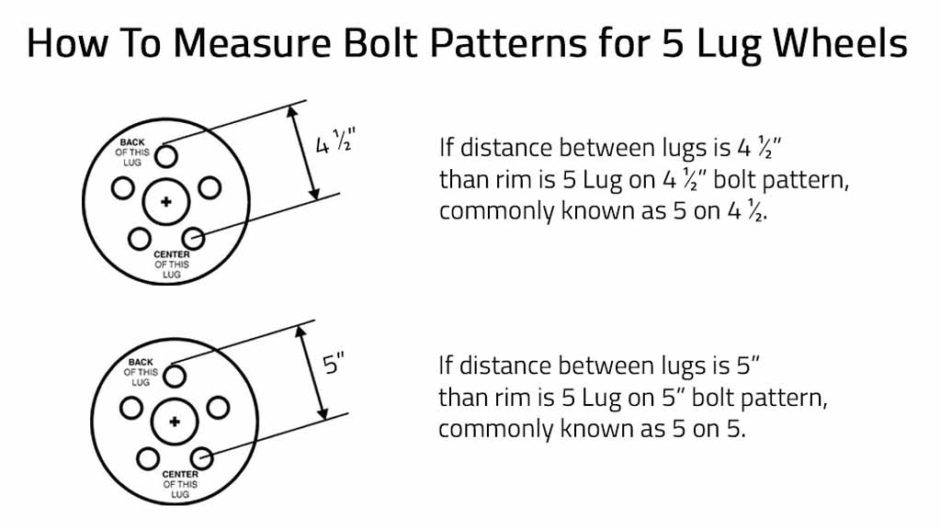Trailer Wheel Lug Pattern Mysteries Decoded: Your Guide to a Perfect Fit!
Ever stared at your trailer wheels, feeling a creeping sense of dread that you might end up with the wrong replacements? Fear no more! Deciphering the cryptic code of trailer wheel lug patterns is easier than assembling flat-pack furniture (sometimes). This guide dives deep into the world of trailer wheel bolt patterns, arming you with the knowledge to conquer the challenge of finding the perfect fit. Get ready to ditch the guesswork and embrace wheel-matching mastery.
Imagine: you're cruising down the highway, the wind in your hair (metaphorically, of course, because helmets are important), when suddenly… *thump thump thump*. A flat tire. But you're prepared! You have a spare. Except... it doesn't fit. The bolt pattern is different. Tragedy! This common nightmare can be avoided by understanding how to determine your trailer's wheel lug pattern.
Determining the correct trailer wheel lug pattern isn't just about avoiding roadside emergencies. It's about safety, performance, and peace of mind. An incorrect lug pattern can lead to wheel wobble, premature tire wear, and even catastrophic wheel failure. So, let's get down to the nuts and bolts (pun intended) of measuring your trailer's wheel bolt pattern.
The history of wheel lug patterns is a fascinating journey through automotive evolution. From the early days of horse-drawn carriages to modern trailers, the need to secure wheels effectively has driven innovation. Early wheels relied on simple through-axles, but as vehicles became more complex, so did the methods of wheel attachment. The development of the lug pattern allowed for quicker wheel changes and more secure mounting.
The importance of accurate lug pattern measurement cannot be overstated. It’s the foundation upon which safe and reliable trailer operation rests. A mismatch can lead to a variety of problems, including loose wheels, vibrations, and even complete wheel detachment. These issues not only compromise your safety but also potentially endanger others on the road. Understanding how to measure your trailer's wheel lug pattern is a crucial step in responsible trailer ownership.
A trailer wheel lug pattern is defined by the number of lug holes and the diameter of the circle on which they are positioned. For example, a common pattern is 5 on 4.5 inches. This means the wheel has 5 lug holes and the circle formed by the center of those holes has a diameter of 4.5 inches.
Benefits of Knowing Your Lug Pattern:
1. Safety: A correct fit ensures wheel stability, preventing accidents caused by loose or detached wheels.
2. Efficiency: No more wasted time ordering and returning incorrect wheels. You'll get it right the first time.
3. Cost Savings: Avoid the expense of replacing damaged wheels and tires caused by an incorrect lug pattern.
How to Measure Your Trailer Wheel Lug Pattern:
1. For Even-Numbered Lug Patterns (4, 6, 8): Measure the center-to-center distance between two opposite lug holes.
2. For Odd-Numbered Lug Patterns (5, 7): Measure from the center of one lug hole to the outermost edge of the opposite lug hole. Then, consult a lug pattern chart to find the corresponding diameter based on this measurement.
Tips and Tricks: Use a ruler or caliper for accurate measurements. Clean the mounting surface for precise readings.
Advantages and Disadvantages
| Advantages | Disadvantages |
|---|---|
| Safety | Requires measurement tools |
| Correct wheel fit | Can be confusing for odd-numbered patterns |
Frequently Asked Questions:
1. What happens if I use the wrong lug pattern? Wheel wobble, damage, potential detachment.
2. Where can I find a lug pattern chart? Online retailers, automotive websites.
3. Do I need special tools to measure? A ruler or caliper is recommended.
4. Can I measure the lug pattern with the tire on? Yes, but it can be less accurate.
5. Are all trailer lug patterns the same? No, they vary widely.
6. What's the most common trailer lug pattern? 5 on 4.5 inches is a popular choice.
7. Can I change my trailer's lug pattern? Generally, no. It requires specialized modification.
8. What if I can't figure out my lug pattern? Consult a trailer specialist or wheel retailer.
Knowing how to determine your trailer wheel lug pattern is essential for maintaining safety, ensuring optimal performance, and extending the life of your tires and wheels. It's a simple task that can prevent costly repairs and potentially dangerous situations. By taking the time to measure correctly, you'll gain confidence in your trailer's readiness for the road, ensuring a smooth and worry-free journey every time.
Accurate trailer wheel lug pattern measurement empowers you to choose the right wheels, enhancing safety and performance. This knowledge translates to a more secure and enjoyable towing experience, allowing you to focus on the adventure ahead rather than worrying about potential wheel issues. So, grab a ruler, inspect your trailer, and unlock the secrets of your wheel lug pattern. Your future self (and your trailer) will thank you!
Enhance your fifa 23 experience with lamine yamal face mods
Conestoga college masters programs elevate your career
Unlocking possibilities sterling bank personal loan guide














